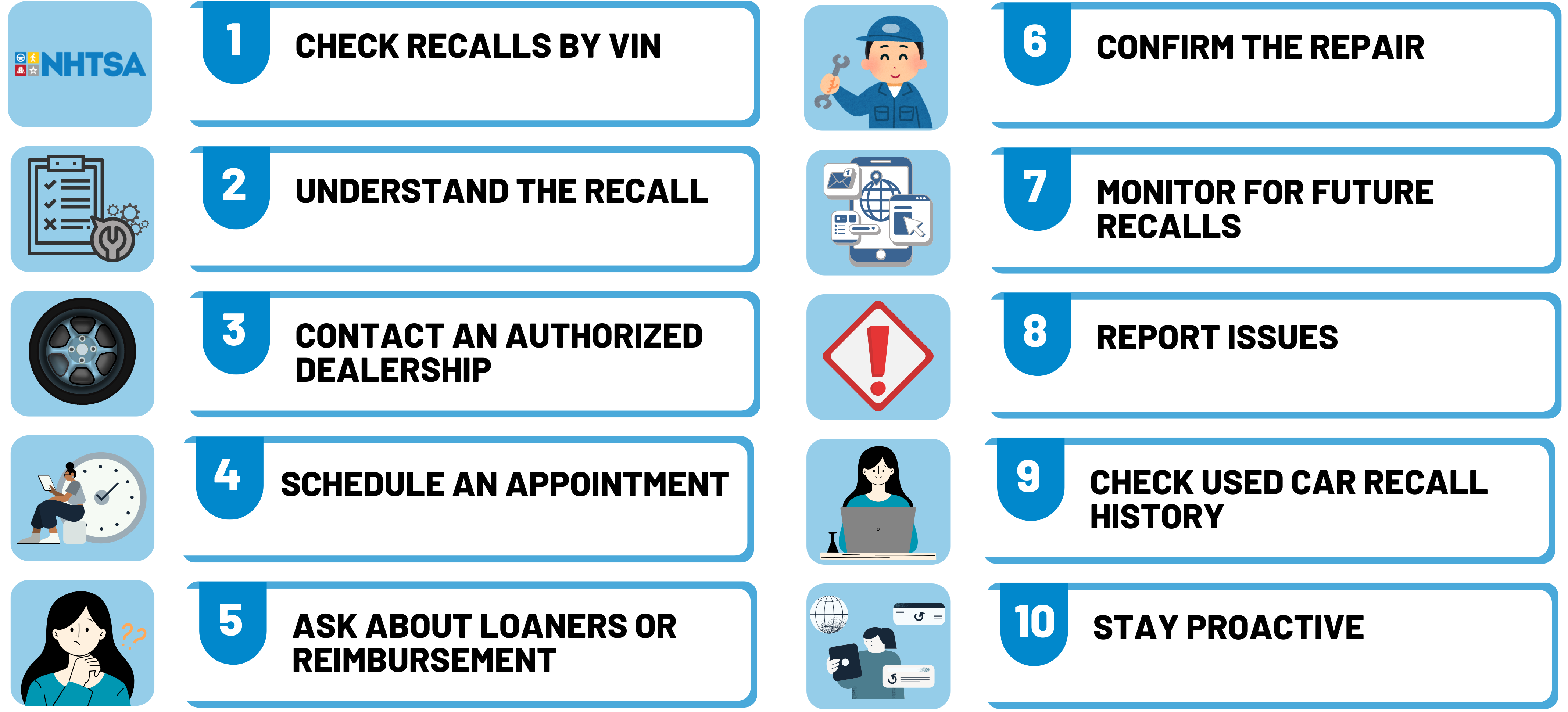
Your car might have survived years of coffee spills and questionable parallel parking, but can it handle a surprise recall? Check recalls by VIN on Toyota, Honda, Chevrolet, and more could save you from discovering defects the hard way. After all, the last thing you want is an unexpected engine stall turning your evening plans into an unplanned roadside stop.
Vehicle recalls help keep you and your passengers safe by fixing potential hazards. This guide explains how to perform a free recall check by VIN for major car brands.
Don’t put it off—Recall Check by VIN Now!
Why You Should Check Recalls by VIN
A vehicle recall check by VIN can reveal hidden dangers in your car—like defective airbags, failing brakes, or engine trouble. Some recalls are minor, but others could put you and your passengers at serious risk.
The good news? If your car has a recall, the manufacturer must fix it for free. Ignoring it, however, could lead to costly repairs, accidents, or a drop in resale value. Stay ahead of potential problems and keep your ride safe by checking for recalls regularly!
How to Perform a Recall Check by VIN
The VIN recall check process is simple and can be done online in minutes. Here’s how:
- Locate Your VIN – This unique 17-character code is found in the following;
- the driver’s side dashboard near the windshield
- inside the driver’s door frame
- on your registration, title, or insurance papers
- Check Recalls by VIN with Right Tools – Many free tools are available, including:
- National Highway Traffic Safety Administration (NHTSA)
- Free VIN lookup services like VinCheck.info
- Manufacturer recall lookup pages.
- Enter Your VIN – Simply type the VIN into the search box and hit enter.
- Review the Recall Results – If your car has an open recall, you’ll see details about the issue, risks, and what needs to be fixed.
- Schedule a Repair – Contact an authorized dealership to schedule a free repair—recall fixes won’t cost you a dime!
Manufacturer-Specific Recall Checks
Most automakers offer easy-to-use VIN lookup tools on their official websites. Here’s where you can check recalls by VIN on some of the biggest brands:
- GM (Chevrolet, GMC, Cadillac, Buick) – GM.com
- Ford – Ford.com
- Toyota – Toyota.com
- Honda – Honda.com
- Nissan – NissanUSA.com
- Hyundai – HyundaiUSA.com
- Mazda – MazdaUSA.com
- Subaru – Subaru.com
- Volkswagen – VW.com
- BMW – BMWUSA.com
- Mercedes-Benz – MBUSA.com
- Chrysler (Stellantis) (Alfa Romeo, Chrysler, Dodge, Jeep, Ram, Fiat) – Mopar.com
- Kia – Kia.com
- Mitsubishi – MitsubishiCars.com
- Tesla – Tesla.com
- Jaguar Land Rover – JaguarUSA.com | LandRoverUSA.com
- Volvo – VolvoCars.com
- Porsche – Porsche.com
- Audi – AudiUSA.com
- Lexus – Lexus.com
- Acura – Acura.com
- Infiniti – InfinitiUSA.com
- Mini – MiniUSA.com
- Genesis – GenesisMotorsUSA.com
- Rivian – Rivian.com
- Polestar – Polestar.com
What to Do If Your Vehicle Has an Open Recall
Got a recall notice? Don’t ignore it—here’s how to handle it quickly and safely:

Check Recalls by VIN
- Use the NHTSA recall lookup tool or your car manufacturer’s website.
- Enter your VIN to see if your car has any safety issues that need fixing.
Understand the Recall
- Read the notice carefully—what’s the risk, what needs fixing, and is it mandatory?
- Some recalls are minor, while others could put you in danger.
Contact an Authorized Dealership
- Only certified dealerships can do recall repairs.
- Repairs (or restitution of any kind) are free, no matter your car’s age or warranty status.
Schedule an Appointment
- Some fixes need special parts—call ahead to avoid long waits.
Ask About Loaners or Reimbursement
- If the recall affects brakes, airbags, or steering, ask about a loaner car, rental reimbursement, or ride assistance.
Confirm the Repair
- Once the fix is done, get written proof—it helps with resale and insurance.
Monitor for Future Recalls
- Sign up for recall alerts through NHTSA, your manufacturer, or third-party services.
Report Issues
- If a dealer refuses to fix it or delays due to parts shortages, report them to NHTSA or the manufacturer.
Check Used Car Recall History
- Before buying a used car, perform a vehicle recall check by VIN for past recalls. Some cars are sold with unfixed issues!
Stay Proactive
- Keep up with service bulletins—some aren’t official recalls but still help with safety concerns.
Common Reasons for Vehicle Recalls
Manufacturers issue recalls for various reasons, including:
| Airbag defects | e.g. Takata airbag recall, improper deployment, inflator explosions. |
| Brake system failures | e.g. faulty brake pads, master cylinder leaks, ABS malfunctions. |
| Fuel system leaks | e.g. fuel pump failures, cracked fuel lines, fire hazards. |
| Electrical system malfunctions | e.g. wiring issues, faulty alternators, dead batteries, software glitches. |
| Steering component issues | e.g. power steering failure, loose steering columns, tie rod defects. |
| Engine and transmission problems | e.g. excessive oil consumption, sudden power loss, defective torque converters. |
| Suspension failures | e.g. control arm fractures, strut issues, unstable handling. |
| Defective seat belts and latches | e.g. failure to lock properly, premature wear, detachment risks. |
| Faulty ignition switches | e.g. stalling while driving, unintended shutdown, key getting stuck. |
| Lighting system failures | e.g. non-functioning brake lights, turn signal malfunctions, faulty headlamps. |
| Unintended acceleration issues | e.g. sticky throttle pedals, electronic throttle malfunctions. |
| Tire defects | e.g. premature tread wear, blowouts, improper adhesion. |
| Structural weaknesses | e.g. frame corrosion, poor crash protection, roof collapse risks. |
Why Recalls Matter: The Bigger Picture
- Protecting Used Car Buyers from Hidden Dangers – Recalls help fix safety issues, so buyers don’t unknowingly purchase unsafe vehicles.
- Boosting Longevity & Reliability – Regular recall repairs prevent small problems from becoming expensive, helping cars last longer and run better.
- Maximizing Resale & Trade-In Value – Cars without open recalls sell faster, and dealerships often pay more for recall-free vehicles.
- Driving with Confidence & Peace of Mind – A recall-free car means fewer risks, so you can enjoy a safer and more reliable ride.
- Avoiding Legal & Financial Pitfalls – Ignoring recalls can lead to costly repairs, legal trouble, or even accidents—staying proactive helps avoid these risks.
- Helping the Environment – Fixing recalls improves fuel efficiency, reduces harmful emissions, and lowers your car’s impact on the planet.
- Smoother Business & Fleet Management – Companies need reliable vehicles, so fixing recalls helps keep fleets safe, compliant, and running without delays.
- Make sure to check your vehicle’s VIN for any open recalls. It’s a quick and easy way to stay safe!
Make sure to perform a vehicle recall check by VIN to stay informed about any outstanding recalls on your car.
Stay Safe, Stay Informed!
Recalls are a fact of life, but knowing about them keeps you in the driver’s seat. A quick, free VIN recall check can help you catch potential issues before they become real problems. Don’t gamble with your safety—check recalls by VIN today!
Know before you go—run a free VIN recall check now and stay protected!